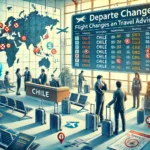“`html
How Technology is Transforming Booking Management in the Travel Industry
The travel industry is no stranger to innovation, having seen myriad changes influenced by technology over the years. As travelers demand more seamless and personalized experiences, the integration of technology into booking management systems has become a pivotal catalyst for change. This article delves into the various ways technology is revolutionizing booking management, offering new opportunities for efficiency, enhancement, and engagement.
The Digital Evolution of Booking Systems
The transition from traditional booking methods to digital platforms has entirely reshaped how bookings are managed. Gone are the days of long waiting times and complicated procedures. Today, travelers are empowered with instant access to a plethora of options at their fingertips. Let’s explore some key technological advancements that have spurred this transformation:
- Online Booking Platforms: Platforms such as Expedia, Booking.com, and Airbnb have simplified the booking process, offering a one-stop-shop for various services like flights, accommodations, and car rentals.
- Mobile Apps: The ubiquity of smartphones has made mobile apps a cornerstone of travel booking. With intuitive interfaces and real-time updates, travelers can manage their bookings on the go.
- AI and Machine Learning: These technologies allow platforms to understand traveler preferences better, ensuring personalized recommendations that enhance the user experience.
AI and Automation in Booking Management
Artificial Intelligence (AI) and automation tools are now indispensable in the travel industry, streamlining operations and providing personalized experiences to each traveler. Here’s how AI and automation are making significant impacts:
- Chatbots and Virtual Assistants: These AI-driven tools provide instant responses to traveler queries, easing the customer support process and making it available 24/7.
- Predictive Analytics: By leveraging data analysis, predictive analytics offer insights into behavior trends, enabling travel agencies to anticipate demands and tailor their services accordingly.
- Dynamic Pricing: Automation helps dynamically adjust prices based on demand, availability, and competition, ensuring competitive pricing strategies that benefit both providers and customers.
Enhancing the Customer Experience
The deployment of technology in booking management is primarily driven by the need to enhance customer experience. Here’s how technology is making travel more comfortable and enjoyable:
- Seamless Integration: Travel agencies are now capable of integrating various services, such as flight and hotel bookings, into a single platform, offering a unified experience.
- Real-time Updates: Through updates on travel itineraries, gate changes, and weather conditions, technology significantly reduces traveler anxiety.
- Personalization: AI algorithms analyze past travel data to suggest ideal destinations, flights, and accommodations, ensuring a custom-tailored experience for each user.
Sustainability and Ethical Travel
As sustainability becomes a prominent consideration among modern travelers, technology is also paving the way for more ethical and sustainable travel options. Here are some innovations pushing this agenda:
- Carbon Offset Calculators: Booking platforms are now integrating tools that calculate the carbon footprint of flights or accommodations, encouraging travelers to choose greener options.
- Eco-friendly Recommendations: AI recommends accommodations and travel methods that align with a traveler’s preference for environmentally friendly options.
- Virtual Reality (VR) Tours: Before making bookings, travelers can experience accommodations and destinations through VR, reducing the need for resource-consuming site visits.
Challenges Posed by Technology
Despite their benefits, technological solutions also bring a set of challenges that the travel industry must tackle. Some of these challenges include:
- Data Privacy: As booking systems collect vast amounts of personal data, ensuring the privacy and security of customer information is crucial.
- Tech Dependence: Over-reliance on technology can lead to significant disruptions in case of technical issues or cyber attacks.
- Digital Divide: Not all regions have equal access to advanced technologies, which can limit the reach of comprehensive online booking solutions.
The Future of Travel Booking
While there are challenges, the future of travel booking systems looks promising with continuous advancements in technology:
- Blockchain Technology: By ensuring secure, transparent, and efficient transactions, blockchain could revolutionize payment systems in travel booking.
- Augmented Reality (AR): AR can provide enriched pre-travel experiences, allowing travelers to visualize destinations and attractions with enhanced context.
- Collaborative Platforms: More collaborations between tech companies and travel agencies are likely to arise, leading to innovative solutions and a more extensive range of services.
In conclusion, technology is dramatically transforming the landscape of booking management in the travel industry. By embracing these advancements, travel agencies can enhance customer experiences and streamline their operations, offering a bright and exciting future for global travelers.
“`









